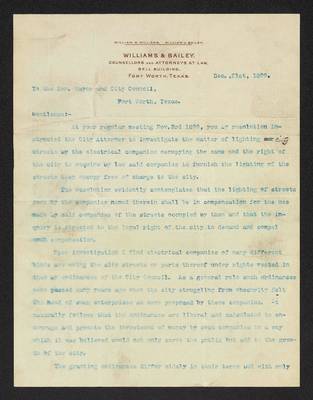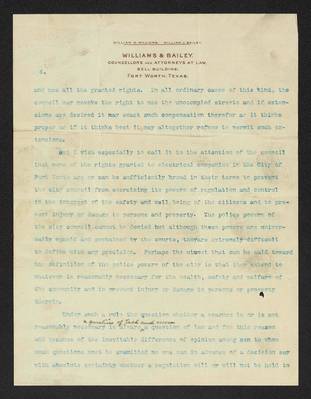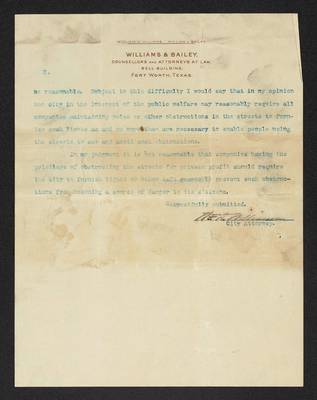Pages
1
William D. Williams, William J. Bailey.
Williams & Bailey, Counsellors and Attorneys at Law, Bell Building, Fort Worth, Texas
Dec., 21st, 1899.
To the Hon. Mayor and City Council, Fort Worth, Texas.
Gentlemen:-
At your regular meeting Nov. 3rd 1899, you by resolution instructed the City Attorney to investigate the matter of lighting city streets by the electrical companies occupying the same and the right of the city to require by law said companies to furnish the lighting of the streets they occupy free of charge to the city.
The resolution evidently contemplates that the lighting of streets done by the companies named therein shall be in compensation for the use made by said companies of the streets occupied by them and that the ininquiry is directed to the legal right of the city to demand and compel such compensation.
Upon investigation I find electrical companies of many different kinds are using the city streets or parts thereof under rights vested in them by ordinances of the City Council. As a general rule such ordinances were passed many years ago when the city struggling form obscurity felt the need of such enterprises as were proposed by these companies. It naturally follows that the ordinances are liberal and calculated in encourage and promote the investment of money by such companies in a way which it was believed would not only serve the public but add to the growth of the city.
The granting ordinances differ widely in their terms but with only
2
WILLIAM D. WILLIAMS WILLIAM J. BAILEY
WILLIAS & BAILEY
COUNSELLORS AND ATTORNEYS AT LAW
BELL BUILDING
FORT WORTH, TEXAS
2.
one exception to which I will hereafter call attention they agree in exacting no compensation or in fixing a merely nominal compensation for the privilege granted.
the authorities are fairly agreed that a grant made by a city council under express or implied legislative authority and not prohibited by any constitutional inhibition to neither a street railway company, ot a telegraph or telephone company, or an electric light or power company of the right to use the streets of a city or any part thereof for any purpose connected with the lawful business of such a company wherein it is performing a public duty, or rendering a service to the public or putting itself in a coniditon to render such a service, when such grant has been accepted by the company to which it was made and in good faith acted upon by the payment of compensation if any has been exacted or by the construction of its plant and the occupation of the granted streets become irrevocable to the extent at least of the acceptance and construction.
It is of no consequence whether the grant be called an easement, a contract, a franchise or a mere license. In respect of its binding force, its essence is in all cases the same. the right, however it be named, has vested and has become a property right which cannot be destroyed or impaired.
I can find no authority for calling a grant for a fixed term of years an irrevocable contract and holding a grant with no fixed limit a mere license revocable at the will of the grantor. On the contrary in a number of cases wherein the legal affect of unlimited grants was being
3
WILLIAM D. WILLIAMS. WILLIAM J. BAILEY
WILLIAMS & BAILEY,
COUNSELLORS AND ATTORNEYS AT LAW.
BELL BUILDING.
FORT WORTH, TEXAS
3.
considered the same were held to vest easements.
I conclude then that as a general rule of Fort Worth has no legal right to exact additional compensation, either in the shape of street lighting or in any other way, of the electrical companies using its streets under previous grants from the city council.
But in that grant to Stratton & White of the right to erect poles, string wires and conduct electricity for light and power along the city streets I find an incomplete and imperfect provision for the payment by the grantees of compensation for the rights granted and I believe the conditions and terms of the ordinance are such as to justify the inferences that some compensation was to be paid and as the same has not been fixed it is open to the council to fix a reasonable sum. I am told that this grant to Stratton & White is the one under which the Standard Light & Power Company is operating. The question whether a greater burden shall be placed upon this company than is borne by its competitors in business is one which addresses itself to the discretion and good judgement of the city council and is not for me to discuss.
It also appears that some grants to electrical companies have been made in very general terms covering all the streets and alleys in the city. In no such case has the grantee actually occupied all the streets and alleys upon which it has been authorized to enter. As to the highways not occupied such grants have not taken effect unless it may be in some exceptional cases where the grantee has never ceased the work of extension and has made a reasonable and constant effort to occupy
4
WILLIAM D. WILLAMS. WILLIAM J. BAILEY
WILLIAMS & BAILEY, COUNSELLORS AT LAW, BELL BUILDING, FORT WORTH, TEXAS
4.
and use all the granted rights. In all ordinary cases of this kind, the council may revoke the right to use the unoccupied streets and if extensions are desired it may exact such compensation therefore as it thinks proper or if it thinks best it may altogether refuse to permit such extensions.
But I wish especially to call it to the attention of the council that none of the rights granted to electrical companies in the City of Fort Worth are or can be sufficiently broad in their terms to prevent the city council from exercising its powers of regulation and control in the interest of the safety and well being of the citizens and to prevent injury or damage to person and property. The police powers of the city council cannot be denied but although these powers are universally upheld and sustained by the courts, theyare extremely difficult to define with any precision. Perhaps the utmost that can be said toward the definition of the police powers of the city is that they extend to whatever is reasonably necessary for the health, safety and welfare of the community and to prevent injury or damage to persons or property therein.
Under such a rule the question whether a measure is or is not reasonably necessary is always a question of fact and never a question of law and for this reason and because of the inevitable difference of opinion among men to whom such questions must be submitted no one can in advance of a decision say with absolute certainty whether a regulation will or will not be held to
5
WILLIAM D. WILLAMS. WILLIAM J. BAILEY
WILLIAMS & BAILEY, COUNSELLORS AT LAW, BELL BUILDING, FORT WORTH, TEXAS.
5.
be reasonable. Subject to this difficulty I would say that in my opinion the city in the interest of the public welfare may reasonably require all companies maintaining poles or other obstructions in the streets to furnish such lights as and no more than are necessary to enable people using the streets to see and avoid such obstructions.
In my judgment it is not reasonable that companies having the privilege of obstructing the streets for private profit should require the city to furnish lights or other safe guards to prevent such obstructions from becoming a source of danger to its citizens.
Respectfully Submitted.
Wm. D. Williams City Attorney.




